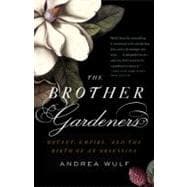This is the fascinating story of a small group of eighteenth-century naturalists who made Britain a nation of gardeners and the epicenter of horticultural and botanical expertise. It's the story of a garden revolution that began in America. In 1733, the American farmer John Bartram dispatched two boxes of plants and seeds from the American colonies, addressed to the London cloth merchant Peter Collinson.
Most of these plants had never before been grown in British soil, but in time the magnificent and colorful American trees, evergreens, and shrubs would transform the English landscape and garden forever. During the next forty years, Collinson and a handful of botany enthusiasts cultivated hundreds of American species.
The Brother Gardeners follows the lives of six of these men, whose shared passion for plants gave rise to the English love affair with gardens. In addition to Collinson and Bartram, who forged an extraordinary friendship, here are Philip Miller, author of the best-selling Gardeners Dictionary; the Swedish botanist Carl Linnaeus, whose standardized nomenclature helped bring botany to the middle classes; and Joseph Banks and Daniel Solander, who explored the strange flora of Brazil, Tahiti, New Zealand, and Australia on the greatest voyage of discovery of their time, aboard Captain Cook's Endeavour.
From the exotic blooms in Botany Bay to the royal gardens at Kew, from the streets of London to the vistas of the Appalachian Mountains, The Brother Gardeners paints a vivid portrait of an emerging world of knowledge and of gardening as we know it today. It is a delightful and beautifully told narrative history.
“Wulf’s flair for storytelling is combined with scholarship, brio, and a charmingly airy style. . . . A delightful book—and you don’t need to be a gardener to enjoy it.”-The New York Times Book Review
“A lively account . . . renders with clarity and grace a significant chapter in horticultural history . . . Elegant, humorous and accessible. . . A erudite, pleasurable and handsome book."-Richmond Times Dispatch
“Vigorous … powerful …Wulf draws the threads of her story compellingly together and lights up an “American connection” in Georgian garden growth as never before.”-The Financial Times
“Engaging.”-The New Yorker
“A fascinating and beautifully researched story.”-Philadelphia Tribune
“Engaging. . . . Lavishly researched. . . . Wulf never allows her material to overwhelm a vivid sense of the big picture, which keenly informs her sparkling narrative.”-Bookforum








